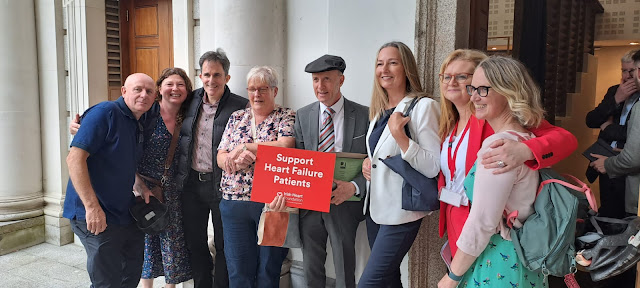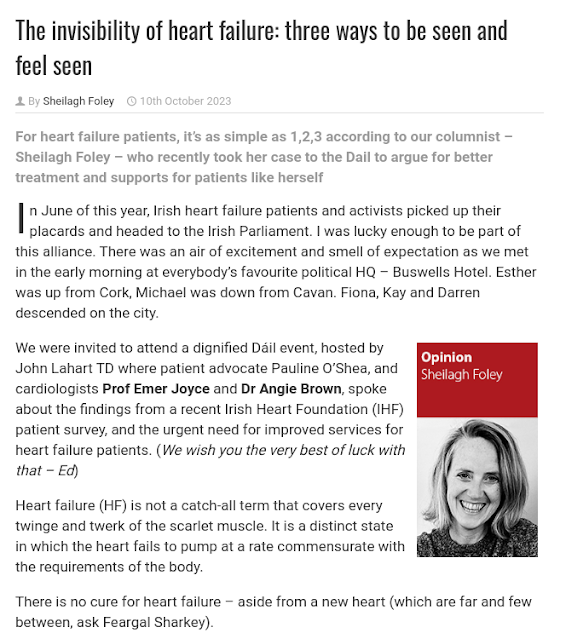The Irish Medical Times - The Invisibility of Heart Failure: Three Ways to be Seen
However, with skillful medicating, surveillance, and lifestyle modifications patients can achieve periods of stability and live a version of their lives.
But for most people there are frequent ups and downs, they are in and out of infirmaries, their life span is limited, and they have to spend a lot of time convincing people (including themselves) that just because they look ok, doesn’t mean they are ok. It is a perfect example of an invisible disability.
I know because I am one of the invisible. However, on that day in June I didn’t feel alone. As the patients bunched together in the room, we were visible, if even for an afternoon. Some of the comments afterwards focused on how surprisingly young we were for heart failure patients. It is a condition heavily associated with the elderly, but revised figures are estimating as much as 43,000 Irish people under 70 are living with heart failure. To fully understand the gravity of that number - if we compress all of those diagnoses into a 12 month period, it would be akin to 120 young people being diagnosed with HF every day for a year!
Ultimately, every sinner on this planet will die from a heart that fails. It might be preceded by cancer, a gunshot wound, or a cup of tea and the Late Late Show, but at the end of the day our hearts will stop beating.
Yet, heart patients are often overlooked and under-resourced.
Some consider it an inevitable problem that is too big to even begin to address. So, the IHF broke it down into a short list of fulfillable ‘Asks’.
Heart Failure patients require three things from the Irish government:
Psychological supports
Medical cards
A Heart Failure register
The IHF would also like to see investment in community based support and access to cardiac rehab nationwide.
1. Psychological supports
Distress, anxiety, fear, depression, trauma, are all common experiences in heart failure. Everyone in the Dȧil, heart patient or not, has experienced bad days and feral emotions, there was nodding and listening as this topic was discussed. IHF Advocacy Campaign Manager, Pauline, also a heart failure patient, captivated the room with her honest account of how harrowing HF can be. She spoke with a power and eloquence that only lived-experience and natural charisma can bestow.
Support is needed to understand and manage the condition of heart failure, to adjust to an impaired life, and to simply try and cope. When you are struggling mentally, physically or emotionally it can lead to maladaptive behaviour such as failure to take medication/exercise/nutrition. Psychological support for heart failure patients is a basic requirement and will help prevent costly relapses and readmissions.
Cardiac psychologists exist in Ireland but in very limited numbers and only attached to a smattering of hospitals. If patients receive counselling it is usually instigated and organized by the patient. There is no psychological safety net, there is no mental health check-in, when you are discharged you are in freefall until someone catches you or you hit rock bottom.
The knock on effects of a well adjusted patient will improve the lives of family members, friends, colleagues (not to mention healthcare professionals and caregivers) and will boost the country’s Gross Domestic Happiness.
2. Medical cards
The room was gently filling up with politicians of all hues as the case for medical cards for heart failure was explained.
Heart failure is an expensive illness with a daily laundry list of medications, frequent doctors visits, hospital excursions, scans, tests, device checks, blood tests and procedures - and that’s before things start to become serious and the patient's other organs are compromised, their mobility is challenged, and their care becomes more intense and integrated.
HF patients often have to modify or give up work mainly due to persistent fatigue, dips in heart function, and comorbidities, creating a shortfall in income to fund their hospital hobbies. For those that live more rurally their basic care is spread across their GP, their local hospital, and a consultant in a bigger hospital, usually a significant distance away.
A patient may look normal in the early stages of heart failure or during periods of long stability, but they know they are dancing under Damocles sword.
All of the patients in the Dȧil that day have had to give up the life they used to have. Remarkably, they are all a shining example of 'when life gives you lemons you make lemonade'. Except they didn’t make lemonade, they made lemon meringue pie and left everyone wondering ‘how did they do that!’.
We can appear so able bodied and capable it is hard for those around us to remember we are not 'normal'. We have short bursts of energy but spend a lot of our days battling bone shaking fatigue, we have daily fluid restrictions so our lungs don’t fill up with water and drown us, we can’t run, or be who we once were. At times our heartbeat can vary from the infrequent dread-note of doom to the hyperactive thumping of electronic dance music.
In order to provide fair and equitable care, to look after all disabilities, to ease the financial burden of the disease, and to just ‘do the right thing’, the government needs to provide medical cards to heart failure patients (with or without the lemons!).
3. Heart failure register
Countries create databases of diseases as a way of managing the disease. A heart failure register would provide evidence for best practice, measure outcomes, provide feedback, improve the quality of care, and make sure heart failure patients are protected and prioritized.
The European Society of Cardiology has engaged a study to look into creating a general heart failure register for all of Europe. How awkward is it going to be when they ask Ireland for their list and the government has to scrabble around seeing if they can cog someone else’s homework.
A register will save time and money and benefit society as a whole.
Arguments for a HF register were put across in a more elegant manner in the Dȧil by the esteemed doctors from the Irish Heart Foundation.
They were followed by impassioned impromptu stories from patients of their own real life struggles. The politicians had been snapping photos of the slides, jotting down notes, whispering and slipping amongst each other. Until the patients started to speak, and silence fell.
Fiona Meagher and Michael Madigan shared their traumatic heart failure experiences. Pointing out there were many influential people in the room who could assist in progressing our patient requests.
When Esther O’Shea, from the rebel county, stood up to give her impassioned plea from the benches, the crowd was brought to the edge of tears as she talked of her young family and how she was afraid to go to sleep at night in case she didn’t wake in the morning.
That is the harsh reality facing heart failure patients.
Making a difference is in the hands of the politicians. Please do the right thing - it’s as easy as 1, 2, 3.
__
SIDEBAR (Box)
The IHF survey from 2022 findings:
74% of HF patients had no (or inadequate) psychological support
60% of HF patients experienced a drop in income and an increase in living expenses
40% of working age HF patients had no medical card or GP visit card
96,000 people in Ireland have heart failure yet there is no register
1 in 4 HF patients felt abandoned after discharge from hospital


Comments
Post a Comment